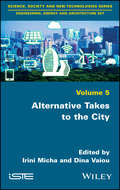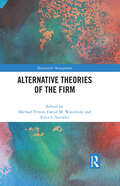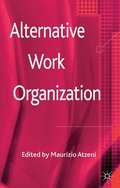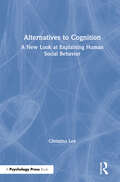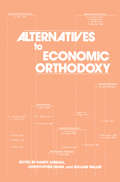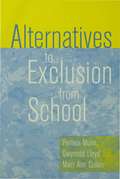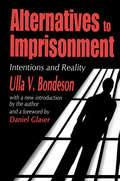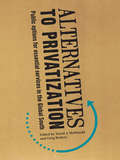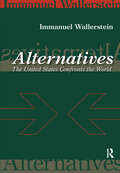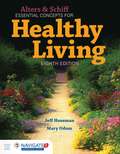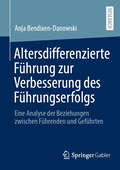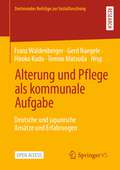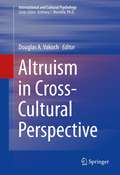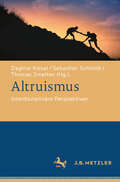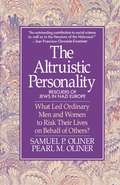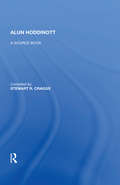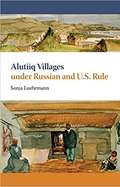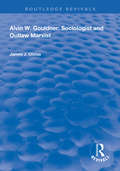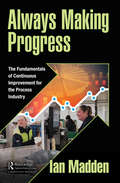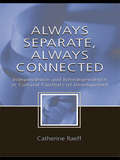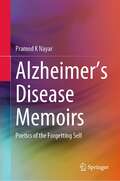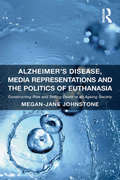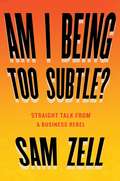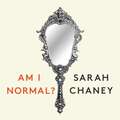- Table View
- List View
Alternative Takes to the City
by Irini Micha Dina VaiouAlternative Takes to the City presents the mosaic of relations and socio-spatial conditions which compose the plurality of contemporary everyday space(s) in cities, offering "a view from below". It proposes a multidisciplinary and gendered approach to the (relational) spatialities and temporalities of the everyday, of new mobilities and of global and local networks which constitute urban life in contemporary cities. The book raises an empirically informed theoretical proposition which springs from the multiplicity of everyday experiences, as a laboratory for understanding recent socio-spatial, political and ideological transformations. Each chapter takes forward the theoretical argument based on one or more examples of concrete cities, in order to unveil the complexity and diversity of the urban condition in changing conjunctures, in which local practices connect and collide with global developments.
Alternative Theories of the Firm (Humanistic Management)
by Michael PirsonThe Theory of the Firm is commonly viewed as axiomatic by business school academicians. Considerations spanning organizational structures, their boundaries and roles, as well as business strategies all relate to the theory of the firm. The dominant theory of the firm poses that markets act perfectly to maximize the well-being of society when people act to maximize the personal utility of their individual purchases and firms act to maximize financial returns to their owners. However, burgeoning evidence and discourse across the scientific and policy communities suggests that the economic, social, and environmental consequences of accepting and applying this theory in the organization of business and society threatens the survival of the human species, among countless others. This book provides the latest thinking on alternatives to the theory of the firm as cornerstone of managerial decision making. Authors explore and elucidate theories that help us understand a firm differently and suggest alternatives to the theory of the firm. This book will be of value to researchers, academics, practitioners, and students interested in leadership, strategic management, and the intersection of corporate interests and the wellbeing of society.
Alternative Work Organizations
by Maurizio AtzeniCurrent and historical examples in the labour movement worldwide have helped to debunk the myth that workers cannot run production. Workers can take control of factories, reverting many assumptions about property, management, work organisation, wages andchallenge the almost natural character of capitalist work relations. This volume uses geographically and historically diverse examples to analyse the challenges and questions that alternative forms of work present to those involved.
Alternatives to Cognition: A New Look at Explaining Human Social Behavior
by Christina LeeIn this provocative book, Christina Lee takes a consciously critical approach to the apparently unchallenged principle that conscious thought is the cause of all human behavior. Without becoming polemical or destructive, she reconsiders a wide range of issues in mainstream American and European social psychology. Suitable for an international audience, the book deals with issues in mainstream American and European social psychology. It assumes some familiarity with contemporary social and applied psychology, and would be appropriate as a text or supplementary reading for senior undergraduate and postgraduate courses in social psychology and psychological theory, although it is also written with an academic research audience in mind. While it is written largely for psychologists, it would also be of interest to academics from other social-science disciplines with a general interest in explanations of individual social behavior.
Alternatives to Economic Orthodoxy: Reader in Political Economy
by Randy AlbeldaExploring the question of whether China's peasantry was a revolutionary force, this volume pays particular attention to the first half of the 20th century, when peasant-based conflict was central to nationwide revolutionary processes. It traces key themes of social conflict and peasant resistance.
Alternatives to Exclusion from School
by Mairi Ann Cullen Pamela Munn Gwynedd Lloyd`. . . an excellent volume, one which should become essential reading for students of education, especially those at the start of their careers. Incidentally, not only is the book concise; unusually for a jointly-authored book it is also hard to see the joins; it really does read well' - Scottish Affairs `An interesting comparison of pairs of schools which differed in the extent to which they excluded, the authors found several differences: the schools' views on what education is all about; the way the curriculum is structured; relations with parents; and decision-making about exclusion' - Times Educational Supplement Exclusion from school is a major concern for teachers, parents and children, and features in government initiatives. This book takes a broad look at exclusion, mapping the extent of exclusions and showing what factors can lead to children being excluded, whether permanently or informally, from school. The authors focus on various kinds of in-school alternatives to exclusion. They show how schools and teachers can make a difference to young people's emotional and social development, as well as to their cognitive-intellectual development. For many children with difficulties in their families or communities, school can be a safe and supportive refuge. School is also much more than just the subjects on the timetable, and the authors look in detail at the hidden curriculum, or school ethos, as a means of preventing exclusion. The book goes beyond in-school alternatives to consider the effectiveness of out-of-school provision, and raises questions about how to conceptualize effectiveness. The authors consider perspectives on exclusion from other countries including the United States, and place exclusion from school in the broader context of social exclusion.
Alternatives to Imprisonment: Intentions and Reality
by Ulla V. BondesonThe detrimental effects of imprisonment have been documented and accepted in most western countries. As a result, alternatives to incarceration have been sought in the effort to reform the penal system. Although during the last thirty years several Nordic official committees have recommended a reduction in the use of jail sentences and an increase in other forms of punishment (i.e. fines and probation) in the hope of decreasing crime and rehabilitating criminals, incarceration rates have been going up in Sweden, Denmark, and Norway. Still, the interest in alternatives to imprisonment continues to grow, but few studies have actually been published that examine their effectiveness.
Alternatives to Privatization: Public Options for Essential Services in the Global South (Routledge Studies in Development and Society)
by Greg Ruiters David A. McDonaldThere is a vast literature for and against privatizing public services. Those who are against privatization are often confronted with the objection that they present no alternative. This book takes up that challenge by establishing theoretical models for what does (and does not) constitute an alternative to privatization, and what might make them ‘successful’, backed up by a comprehensive set of empirical data on public services initiatives in over 40 countries. This is the first such global survey of its kind, providing a rigorous and robust platform for evaluating different alternatives and allowing for comparisons across regions and sectors. The book helps to conceptualize and evaluate what has become an important and widespread movement for better public services in the global South. The contributors explore historical, existing and proposed non-commercialized alternatives for primary health, water/sanitation and electricity. The objectives of the research have been to develop conceptual and methodological frameworks for identifying and analyzing alternatives to privatization, and testing these models against actually existing alternatives on the ground in Asia, Africa and Latin America. Information of this type is urgently required for practitioners and analysts, both of whom are seeking reliable knowledge on what kind of public models work, how transferable they are from one place to another and what their main strengths and weaknesses are.
Alternatives: The United States Confronts the World
by Immanuel WallersteinImmanuel Wallerstein draws on a lifetime of study of long-term historical change to shed light in his newest book on the consequences of the recent, significant turn in U.S. foreign and economic policies. Alternatives shows how the U.S. has been in decline since the 1970s and how these longer trends dovetail with current Bush administration policies, which he describes as an attempt to reverse the decline in ways that are disastrous to the future of the country and the world. The book's middle section is a log of insightful commentaries written between 2001 and 2004 detailing how the Bush administration has broken the pattern of foreign policies set by six presidents from Richard Nixon to Bill Clinton. Wallerstein suggests that a threshold has been crossed that will make it difficult for future presidents to practice the kind of 'soft' multilateralism in foreign policy they have used in the past and maintain effective alliances. He also shows, surprisingly, why 'globalization' already is dead, especially in terms of the United States' ability to dominate economically in the manner that it has since WWII. He calls for a major revision of U.S. policies, and not an attempt merely to return to the pre-Bush foreign policy. In conclusion, Wallerstein's visionary book speaks to the challenges the U.S. must face if it is to play a meaningful and progressive role in the world-system.
Alters And Schiff Essential Concepts For Healthy Living
by Jeff Housman Mary OdumEssential Concepts for Healthy Living, Eighth Edition urges students to think critically about their health and overall wellness and empowers them, with clearly identified tools, to help them reach this goal. It provides a clear and concise introduction to the latest scientific and medical research in personal health and highlights common behaviors and attitudes related to individual health needs. The Eighth Edition, with an all new author team, includes a wealth of new and updated data, including modern information on violence and abuse, relationships and sexuality, and physical fitness.
Altersdifferenzierte Führung zur Verbesserung des Führungserfolgs: Eine Analyse der Beziehungen zwischen Führenden und Geführten
by Anja Bendixen-DanowskiIn dieser Studie erfolgte erstmals im Rahmen der altersdifferenzierten Führungsforschung eine Analyse der Beziehungen zwischen Führenden und Geführten eines Unternehmens. Der dreistufige Mixed-Method-Ansatz umfasst qualitative Expertise-Interviews (N = 30), welche die Grundlage für eine Online-Befragung der Mitarbeitenden (N = 249, 68 %) einer digitalaffinen Firma bildeten. Im anschließend virtuell durchgeführten zweitägigen Führungskräfteworkshop (N = 30) wurden Handlungsempfehlungen abgeleitet. Diese zielten darauf ab, die Ansprüche von Berufseinsteigenden zu berücksichtigen, die Interesse an beruflicher Weiterentwicklung und abwechslungsreichen Arbeitsaufgaben zeigten. Zusammenfassend lässt sich konstatieren, dass die Bewältigung der Distanz, die durch das zweijährige Homeoffice während der COVID-19-Pandemie entstanden ist, eine anspruchsvolle Führungsaufgabe darstellt. Das Ziel der hier angestoßenen Organisationsentwicklung besteht in der langfristigen Steigerung der Arbeitszufriedenheit und Leistungsbereitschaft. Die abgeleiteten praktischen Implikationen empfehlen sich für einen Praxistransfer.
Alterung und Pflege als kommunale Aufgabe: Deutsche und japanische Ansätze und Erfahrungen (Dortmunder Beiträge zur Sozialforschung)
by Franz Waldenberger Tomoo Matsuda Gerd Naegele Hiroko KudoDie Beiträge in diesem Open-Access-Sammelband beschreiben und analysieren aus multidisziplinärer Sicht die Herausforderungen und Bewältigungsstrategien von Alterung und Pflege in japanischen und deutschen Gemeinden. Thematisiert werden rechtliche Rahmenbedingungen, zivilgesellschaftliches Engagement, Pflegekräftemangel, Technologiekonzepte für die Pflege und schließlich auch der Einfluss der Covid-19 Pandemie auf die Situation älterer und pflegebedürftiger Bürgerinnen und Bürger. Die Gegenüberstellung der Ansätze und Erfahrungen beider Länder erweitert das Spektrum an Gestaltungsmöglichkeiten und kann Impulse für eine Neuausrichtung bestehender Lösungsstrategien geben.
Altruism in Cross-Cultural Perspective (International and Cultural Psychology)
by Douglas A. VakochAltruism in Cross-Cultural Perspective provides such a scholarly overview, examining the intersection of culture and such topics as evolutionary accounts of altruism and the importance of altruism in ritual and religion. The past decade has seen a proliferation of research on altruism, made possible in part by significant funding from organizations such as the John Templeton Foundation. While significant research has been conducted on biological, social, and individual dimensions of altruism, there has been no attempt to provide an overview of the ways that altruistic behavior and attitudes vary across cultures. The book addresses the methodological challenges of researching altruism across cultures, as well as the ways that altruism is manifest in difficult circumstances. A particular strength of the book is its attention to multiple disciplinary approaches to understanding altruism, with contributors from fields including psychology, anthropology, sociology, biology, communication, philosophy, religious studies, gender studies, and bioethics.
Altruismus: Interdisziplinäre Perspektiven
by Sebastian Schmidt Dagmar Kiesel Thomas SmettanAltruismus scheint im Alltagsverständnis seinen uneingeschränkt positiven Ruf als ebenso wünschenswerte wie seltene Tugend verloren zu haben und durch ein Ethos des Eigennutzens ersetzt worden zu sein. Angesichts globaler Krisen wie dem Klimawandel, großer Flüchtlingsbewegungen, Kriege und Armut ist die Bereitschaft zur Verhaltensänderung bzw. zum Verzicht zugunsten kommender Generationen oder hilfsbedürftiger Menschen weniger selbstverständlich als das Phänomen der psychologischen Reaktanz und die Weigerung, Einschränkungen der persönlichen Freiheit oder des Konsums hinzunehmen. Zeitgenössische Ethikerinnen und Ethiker müssen sich demnach mit der Frage nach der Motivation für ein Handeln auseinandersetzen, das in erster Linie nicht dem eigenen Wohl, sondern dem Wohl anderer dient. In diesem Sinne beleuchtet der vorliegende Band das Thema Altruismus in seinen verschiedenen, wechselseitig aufeinander verweisenden Facetten: Wie ist das Wesen altruistischen Handelns zu bestimmen? Liegt Altruismus in der Natur des Menschen? Lässt sich Altruismus widerspruchsfrei in verschiedene Ethiktypen einordnen? Wie verstehen verschiedene philosophische Traditionen und Religionen den Altruismus? In welchem Verhältnis steht der Altruismus zum guten Leben? Und: Wie ist altruistisches Handeln motiviert? Da diese Fragen in verschiedenen Fachwissenschaften und mit unterschiedlichen Perspektivierungen gestellt werden, ist dieser Sammelband interdisziplinär konzipiert: Philosophie und Religionswissenschaft kommen ebenso zu Wort wie Verhaltensökonomie und Evolutionsbiologie. Auch anthropologische, soziologische und psychologische Zusammenhänge werden beleuchtet. Dementsprechend richten sich die hier versammelten Aufsätze an ein sehr breit gefächertes akademisches Publikum, aber auch an eine interessierte öffentliche Leserschaft außerhalb des universitären Kontexts. Mit Blick auf diese Zielgruppen führen die einzelnen Beiträge in das jeweilige Thema ein und präsentieren gleichzeitig eine eigene Forschungsposition der Autorin bzw. des Autors.
Altruistic Personality
by Samuel P. OlinerWhy, during the Holocaust, did some ordinary people risk their lives and the lives of their families to help others--even total strangers--while others stood passively by? Samuel Oliner, a Holocaust survivor who has interviewed more than 700 European rescuers and nonrescuers, provides some surprising answers in this compelling work.
Altruistic Personality
by Samuel P. OlinerWhy, during the Holocaust, did some ordinary people risk their lives and the lives of their families to help others--even total strangers--while others stood passively by? Samuel Oliner, a Holocaust survivor who has interviewed more than 700 European rescuers and nonrescuers, provides some surprising answers in this compelling work.
Alun Hoddinott: A Source Book (Bio-bibliographies In Music Ser. #No. 44)
by R. Craggs StewartAlun Hoddinott is the most important living Welsh composer and one of the most distinguished and prolific composers of his generation internationally. His works have been performed in major centres as far afield as Tokyo and Berlin, Melbourne and Leipzig, New York and Venice as well as the major festivals in Wales and England. He is one of the very few composers to have been commissioned to compose a concerto for Mstislav Rostropovitch.Born in Bargoed, Glamorganshire, in August 1929, Alun Hoddinott started to play the violin and compose at an early age. Some of his works were performed and broadcast whilst he was a student at University College, Cardiff and he later studied with the Australian composer and pianist Arthur Benjamin. His first major success was his Clarinet Concerto No.1, given by Gervaise de Peyer and the Halle Orchestra under John Barbirolli at the 1954 Cheltenham Music Festival.This Source Book lists all Hoddinott's compositions from 1946 to 2005, almost 60 years of phenomenal output, and shows he has achieved a mastery of composition which embraces almost every musical medium. With information given on first performances, manuscript locations and recordings, in addition to details of composition dates, authors/librettists, durations, commissions and dedications amongst much else, this book is a key reference for all those interested in Alun Hoddinott and his music.
Alutiiq Villages Under Russian and U. S. Rule
by Sonja Luehrmann S. LuehrmannSonja Luehrmann’s volume examines Alutiiq history within the larger context of Russian and American expansionism. The author uses source material in both English and Russian in order to create a work focused on the intersection of the two colonial perspectives—throwing light on our understanding of the differences in the way each society incorporated the Alutiiq community, both as a labor force and a social entity. In a series of map essays, Luehrmann examines the changing patterns of settlement and demography among the Alutiiq as the population responded to the conditions they encountered: economic exploitation, new cultural influences, intermarriage, disease, and the eruption of Novarupta. The addition of Russian source material fills an important blank in this unique history and makes Alutiiq Villages Under Russian and U.S. Rule a major resource for anyone working on Alutiiq history or the region’s history in the Russian colonial period.
Alvin W.Gouldner: Sociologist and Outlaw Marxist (Routledge Revivals)
by James J. ChrissPublished in 1999, this book is an exploration of the life and work of American sociologist Alvin W. Gouldner. Gouldner's life and contribution to legal theory is a case study in the limits of critical, self-reflexive inquiry. Hegel's dialect is a major theme running throughout Gouldner's work, and, even throughout his life, Gouldner himself seemed trapped in the unfolding of the spirit through three distinct stages: 1945-1960 - thesis; 1960-1970 - antithesis; and 1970-1980 - synthesis or new thesis. Implications for creating a reflexive critical sociology in Gouldner's image are discussed.
Always Making Progress: The Fundamentals of Continuous Improvement for the Process Industry
by Ian MaddenThis book guides process-industry professionals from the implementation of the basic foundations of Continuous Improvement (CI) through to an organization where CI is a “way of life” and a defining feature of the culture of the organization. The readers of this book are seeking solutions to such pressing issues as: • Eliminatng accidents and near misses. • Reducing customer complaints. • Improving customer delivery performance. • Elimination of accidents and near misses. • Reducing customer complaints. • Improving customer delivery performance. • Introducing new products. • Improving staff productivity. • Removing costs to meet the budget. • Dealing with absence and poor morale. • Improving staff retention. This book provides them with guidance on how to address issues in these areas in a way that enables improvements to be realized quickly but not at the expense of a long-term goal of a sustainable Continuous Improvement culture. In addition, this book presents the implementation of CI as a cyclical journey with no endpoint. The stages are ordered in a sequence that enables the reader to get started in their area of the company and build up the elements without the need for an overall organizational strategy at the beginning. Continuous Improvement is a vast subject with many takes on principles, approaches, and tools. This book is about how all the fundamentals of these areas fit together and, as such, covers only some of them. However, within the bibliography, I have signposted the books that have guided me during my career and which go into the principles, approaches, and tools further.
Always Separate, Always Connected: Independence and Interdependence in Cultural Contexts of Development
by Catherine RaeffIn recent years, there has been a proliferation of theoretical and empirical scholarship on how issues of human separateness, or independence, and issues of human connectedness, or interdependence, are played out in diverse cultural contexts. Despite agreement on the value of understanding culture and development in terms of independence and interdependence, many issues remain open for continued theoretical refinement and empirical analysis.This book presents a fresh conceptualization which holds that independence and interdependence are multifaceted and inseparable dimensions of human functioning that may be defined and enacted differently in different cultures. Thus, the current approach accounts for the fundamental separateness and connectedness of all human beings in a way that is both universally applicable and culturally sensitive. Based on this conceptual approach, the focus of this text is to delineate how varied independence and interdependence issues are interrelated during development in culturally distinct ways. In doing so, the book offers a conceptual approach that moves cultural and developmental analyses beyond investigating whether some cultures value independence or interdependence more or less than others, to investigating how both independence and interdependence are construed and particularized during development around the world.Always Separate, Always Connected: Independence and Interdependence in Cultural Contexts of Development will be of interest to a wide range of developmentalists in psychology, education, family studies, anthropology, and sociology. In addition, the book could serve advanced undergraduates, as well as graduate students in these varied disciplines. It may also be of interest to social welfare practitioners, such as clinical psychologists, guidance counselors, and social workers.
Alzheimer's Disease Memoirs: Poetics of the Forgetting Self
by Pramod K NayarThis book examines writings by people living with Alzheimer's Disease and their caregivers. Its focus areas include the construction of the self in the face of diminishing linguistic and cognitive abilities, the stigmatization of ageing, the various narrative strategies that these texts (often collaborative) employ, the health activism and advocacy generated via a 'biosociality,' and the ethics of care. It examines the 'disease writing' genre about a condition that ravages the ability to use language. It serves as a "literary" examination of the work done in this area through a critical reading of the memoirs of those with AD and caregivers and a healthy dose of literary theory. The book is a valuable resource for those interested in literary and critical theory and researchers in the field of ageing/dementia studies.
Alzheimer's Disease, Media Representations and the Politics of Euthanasia: Constructing Risk and Selling Death in an Ageing Society
by Megan-Jane JohnstoneDrawing on extensive data including news media reports and commentaries, documentaries, courts and court reports, films, websites, professional literature and government and non-government agencies, this book explores the 'Alzheimerisation' of the euthanasia debate, examining the shift in recent years in public attitudes towards the desirability and moral permissibility of euthanasia as an end-of-life 'solution' for people living with the disease - not just at its end stage, but also at earlier stages. With attention to media representations and public understandings of Alzheimer's disease, Alzheimer's Disease, Media Representations and the Politics of Euthanasia sheds light on the processes contributing to these changes in public opinion, investigating the drivers of vexed political debate surrounding the issue and examining the manner in which both sides of the euthanasia debate mobilise support, portray their opponents and make use of media technologies to frame the terms of discourse. Paving the way for a greater level of intellectual honesty with regard to an issue carrying significant policy implications, this book will be of interest to scholars of media and communication, social movements and political communication, and the sociology of health and medicine, as well as researchers and professionals in the fields of palliative and end of life care.
Am I Being Too Subtle?: Straight Talk From a Business Rebel
by Sam ZellThe traits that make Sam Zell one of the world’s most successful entrepreneurs also make him one of the most surprising, enigmatic, and entertaining mavericks in American business. Self-made billionaire Sam Zell consistently sees what others don’t. From finding a market for overpriced Playboy magazines among his junior high classmates, to buying real estate on the cheap after a market crash, to investing in often unglamorous industries with long-term value, Zell acts boldly on supply and demand trends to grab the first-mover advantage. And he can find opportunity virtually anywhere—from an arcane piece of legislation to a desert meeting in Abu Dhabi. “If everyone is going left, look right,” Zell often says. To him, conventional wisdom is nothing but a reference point. Year after year, deal after deal, he shuts out the noise of the crowd, gathers as much information as possible, then trusts his own instincts. He credits much of his independent thinking to his parents, who were Jewish refugees from World War II. Talk to any two people and you might get wild swings in their descriptions of Zell. A media firestorm ensued when the Tribune Company went into bankruptcy a year after he agreed to steward the enterprise. At the same time, his razor-sharp instincts are legendary on Wall Street, and he has sponsored over a dozen IPOs. He’s known as the Grave Dancer for his strategy of targeting troubled assets, yet he’s created thousands of jobs. Within his own organization, he has an inordinate number of employees at every level who are fiercely loyal and have worked for him for decades. Zell’s got a big personality; he is often contrarian, blunt, and irreverent, and always curious and hardworking. This is the guy who started wearing jeans to work in the 1960s, when offices were a sea of gray suits. He’s the guy who told The Wall Street Journal in 1985, “If it ain’t fun, we don’t do it.” He rides motorcycles with his friends, the Zell’s Angels, around the world and he keeps ducks on the deck outside his office. As he writes: “I simply don’t buy into many of the made-up rules of social convention. The bottom line is: If you’re really good at what you do, you have the freedom to be who you really are.” Am I Being Too Subtle?—a reference to Zell’s favorite way to underscore a point—takes readers on a ride across his business terrain, sharing with honesty and humor stories of the times he got it right, when he didn’t, and most important, what he learned in the process. This is an indispensable guide for the next generation of disrupters, entrepreneurs, and investors.
Am I Normal?: The 200-Year Search for Normal People (and Why They Don’t Exist)
by Sarah ChaneyA deep dive into the strange science of the 'Normal', and the roots of an anxiety-ridden modern obsessionBefore the nineteenth century, the term normal was rarely ever associated with human behaviour. Normal was a term used in maths, for right angles. People weren't normal; triangles were.But from the 1830s, this branch of science really took off across Europe and North America, with a proliferation of IQ tests, sex studies, a census of hallucinations - even a UK beauty map (which concluded the women in Aberdeen were "the most repellent"). This book tells the surprising history how the very notion of the normal came about, how it shaped us all, often while entrenching oppressive values. Sarah Chaney looks at why we're still asking the internet: Do I have a normal body? Is my sex life normal? Are my kids normal? And along the way, she challenges why we ever thought it might be a desirable thing to be.
